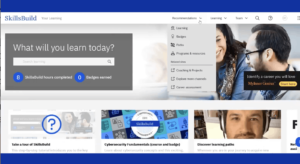Measure, Verify, and Signal Any Skill with Degreed’s New Skill Certification

It’s a show-what-you-know world where demonstrated skills are becoming as valuable or even more valuable than traditional degrees.
Launched in 2012 to leverage and accelerate this trend, Degreed announced the audacious goal to “jailbreak the degree.” The company raised $33 million in four rounds from seven investors including GSV and Rethink Education. For the last five years, the company has been tracking their formal and informal learning. Today they serve two million subscribers and 100 enterprise customers.
The company has been serving motivated college graduates that continue to learn and look for ways to signal that to employers and customers. Corporate clients also appreciate the ability to track learning from internal and external learning experiences.
The problem Degreed is trying to tackle is that the university degree is still the standard measure for expertise, but degrees do not represent current skill sets or skill level. And there is no standard currency to measure skills. There are many niche credentials and they all mean different things.
Measure Any Skill at Any Level
This month, the company made another bold claim—with the new Degreed Skill Certification, Degreed will measure any skill at any level.
Jonathan Munk, General Manager of the new services said they can score applicant skills across a wide spectrum of categories. Degreed has created a new, standardized way for people and employers to measure and communicate career-relevant skills. These skills could be self-taught, learned on the job, or accumulated in HigherEd.
The system works a bit like a graduate school application or an online job interview: you log in and make a claim about a skill by providing “I can” statements supported by three behaviors that support the claim. You provide evidence of the claim and two or three references that can verify the skill. This skill assertion is peer reviewed. Applicants anonymously rank each other on a scale from one to eight. A team of psychometricians also looks at the ratings and ranking. The applicant receives a skill certificate and a rating from one to eight (beginner, capable, intermediate, effective, experienced, advanced, distinguished, master).
 Each skill certification costs $179 ($99 for a limited time), and $399 for as many skills as you want for life.
Each skill certification costs $179 ($99 for a limited time), and $399 for as many skills as you want for life.
Munk thinks this process will be useful for historically difficult to measure skills like critical thinking. It will also be useful in emerging skills like when people started claiming they were “experience designers” and we didn’t really know what that was. He thinks it will be useful in the emerging categories of data science and machine learning.
“We’re striving to become the defacto way to measure and communicate skills,” says Munk. They’ll have to build a two-sided market by attracting both customers and employers that recognize the new certificates. But it is increasingly a show-what-you-know world, and Degreed is another sign of progress.
More Signs of Rebundled Learning
There are 31 million working adults in the US with some college but no degree. Guild Education assembles rapid and affordable degree pathways–many employer supported. Guild announced this week that they had raised another $22 million in a round led by Bessemer Ventures as well as LinkedIn, Skype, 2U, Instructure, Box, Twilio and SendGrid.
“As the labor market tightens, employers are investing over $22 billion annually in traditional tuition assistance programs,” said Rachel Carlson, co-founder and CEO of Guild Education. “Our platform empowers employers to make smarter education investments and measure the positive return on investments in their workforce – it’s ‘Education as a Benefit.'”
Guild’s platform allows companies to easily run their education benefits program and track outcomes data — including recruitment, retention, and promotion — to measure the return on educational benefits. Last week, Chipotle released data finding that employees who enrolled in education programs were nearly 2x as likely to retain with the company after nine months, with 89% retention rates.
For more see:
- Michael Moe on AI in Human Resources in Education
- Top 10 Highlights of the 2017 NMC Horizons Report: HigherEd Edition
- Educating for Global Competence: 6 Reasons, 7 Competencies, 8 Strategies, 9 Innovations
Stay in-the-know with all things EdTech and innovations in learning by signing up to receive the weekly Smart Update.



0 Comments
Leave a Comment
Your email address will not be published. All fields are required.